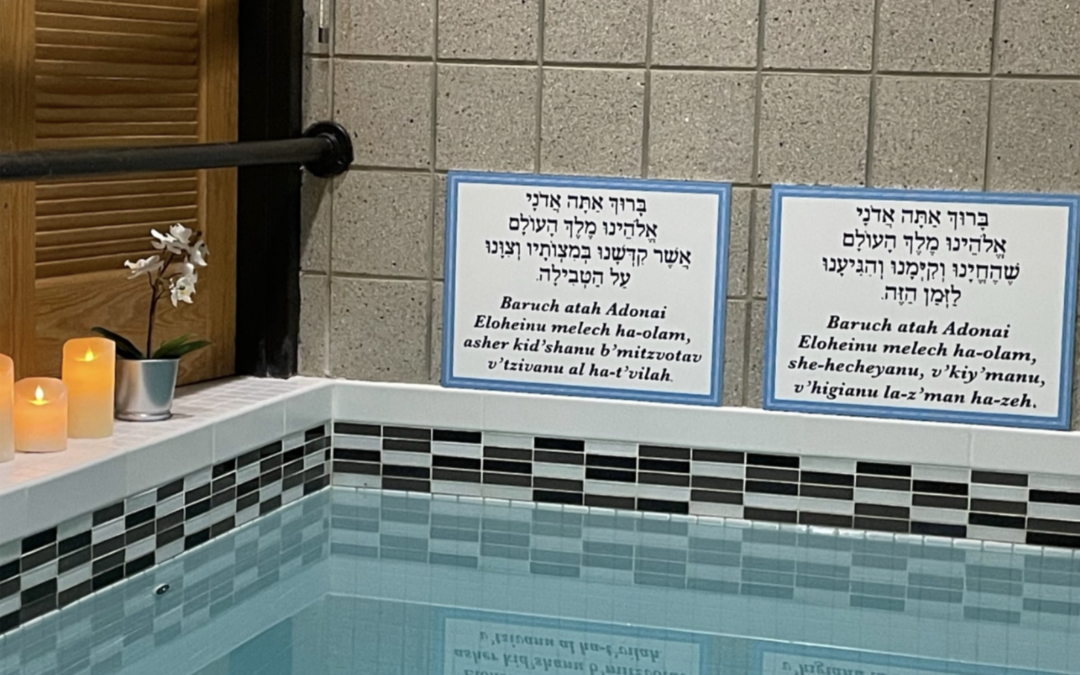If you had told me just one year ago that I would be known as the “mikvah lady,” I would not have believed you. For millennia, Jewish people have immersed in mikvahs, ritual baths used for purification. And although the mikvah has always provided a profound space for marking life’s transitions — like conversion, marriage, and entering adulthood — immersion is also associated with archaic ideas of ritual purity, like women immersing in the mikvah after menstruation and childbirth.
In January of 2023, Rabbi Lizzi Heydemann suggested that I become the administrator of The Community Mikvah, a mikvah connected to Temple Beth Hillel in Wilmette. As a Jewish artist whose work takes a creative approach to sacred texts and rituals, maybe I should have seen this coming. I think R’Lizzi was looking for someone who could lend an artist’s sensibility to this spiritual work. And as I would soon learn, the modern mikvah movement — like my artwork — blends ancient tradition with modern interpretations to create a space for spiritual growth, self-exploration, and community.
The first progressive mikvah, Mayyim Hayyim Living Waters, was founded in 2004 in Boston with the intention of making mikvah meaningful for the full diversity of non-Orthodox Jews for the first time. Mayyim Hayyim developed rituals and readings to make immersion a profound experience in a calm, soft environment. Their gorgeous mikvah was exactly the vibe I was after, the perfect inspiration for The Community Mikvah! However, I immediately discovered that we have, like, no budget, so I found simple ways to make it welcoming with flowers, candles, and soft spa music.
Ritual immersion is a vulnerable act; there must not be any barriers between skin and water. The ritual starts at home the night before, with a long bath before going to bed. On the day the person immerses, they must remove jewelry, nail polish, makeup, lotion and hair products. Because I think of mikvah as an enactment of how we are all immersed in holiness in the world, I encourage people to remove not only external barriers, but internal, spiritual barriers as well. Perhaps they could set an intention, or sit quietly, or journal, or do something that uplifts and inspires them. If it’s a conversion, there needs to be a witness to ensure that they are all the way under the water. But they have privacy. The witness — whatever gender the candidate prefers — will hold a towel up so all that’s visible is the top of their head.
Being a mikvah guide is deeply rewarding. It is incredibly moving to be there when someone immerses to complete their conversion and perform their very first mitzvah. It is so meaningful to guide people as they mark life changes such as surviving trauma or illness, celebrate milestones like retirement or significant anniversaries, or to symbolize a fresh start. The queer Jewish community is also embracing the mikvah, using it to mark significant personal transitions; I recently recruited two trans volunteer guides, and would love to have more on call. But perhaps my all-time favorite immersion was when the whole Mishkan b’mitzvah cohort (and many of their parents!) came to immerse one by one.
I have a library of ceremonies that I draw from, but most often, I give people time to feel what comes to their heart and to experience the water against their skin. There is something transformative about walking down the seven steps and being weightless under the warm water, that gives a deep sense of solace and renewal. The ritual may be thousands of years old, but re-framing immersion gives it life. In Jewish tradition, the first thing a new Jewish community builds in a new village isn’t a synagogue, but a mikvah. There is no reason mikvah shouldn’t be a central part of our “village” too. This reimagined practice is both anchored in ancient Judaism, and made into something joyful and modern — a lot like Mishkan.
It is important that this be a community mikvah. I would love to train more mikvah guides who share a Mishkanite sensibility. If you are interested in setting up an immersion or becoming a mikvah guide, please do not hesitate to reach out! You can email me at [email protected]
Shalom,
Chana Zelig
Builder at Mishkan

